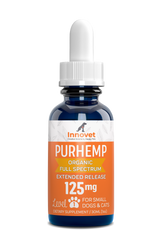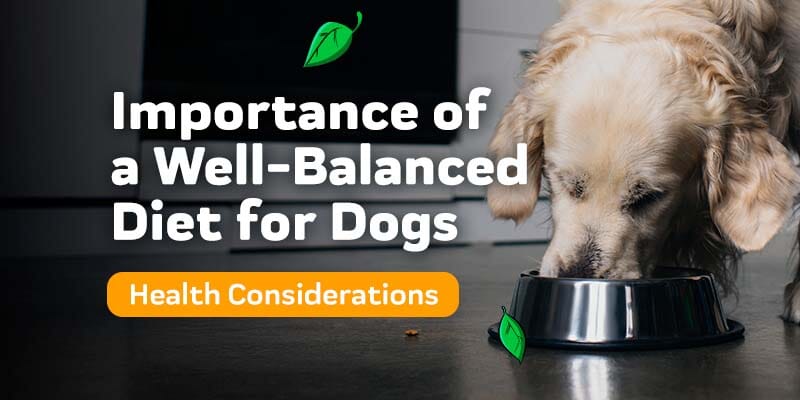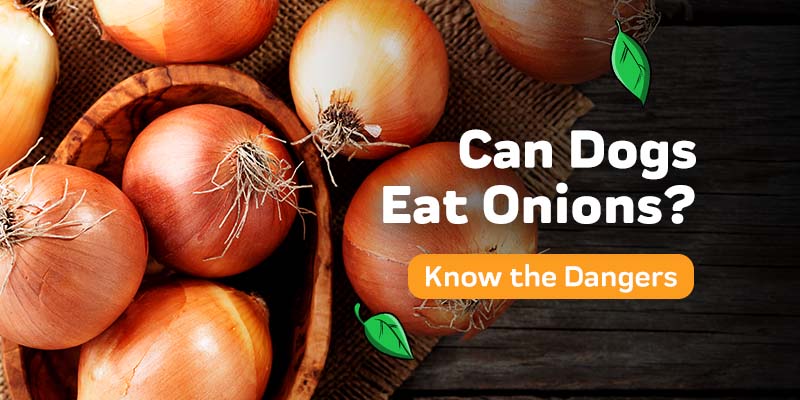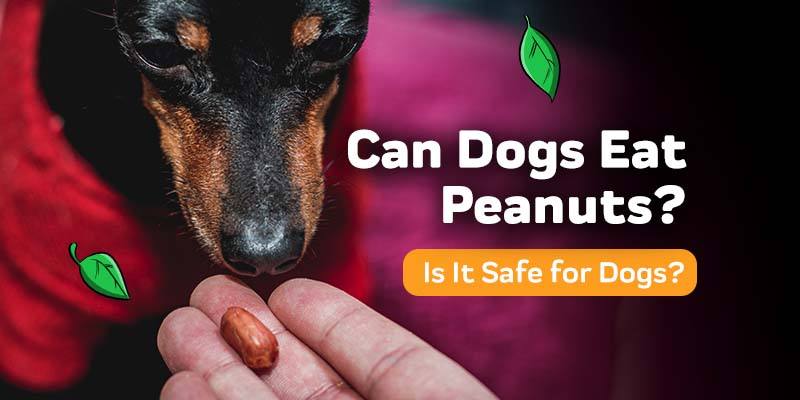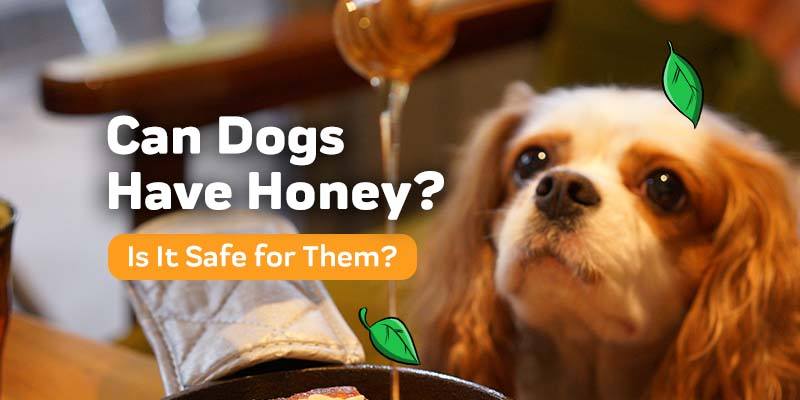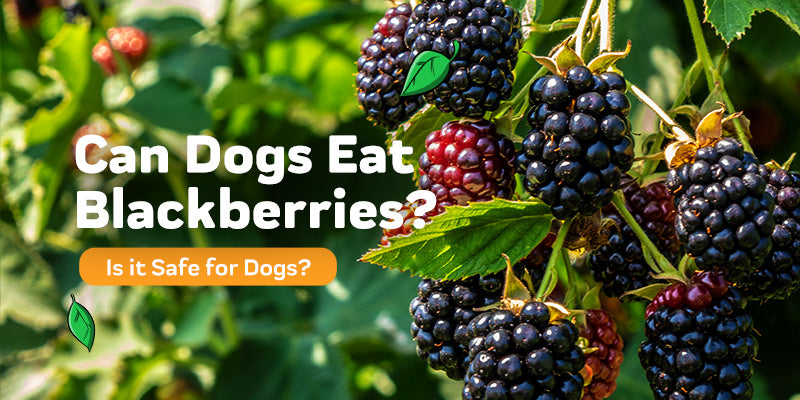
We all know there are some foods cats can't eat, but can cats eat cheese? Whether you want to feed your cat cheese because you think they'll like it, are looking for a way to get your cat with a lack of appetite to eat, or your cat has gotten in some cheese, read on to get the answer to the question, "can my cat eat cheese?"
Do cats eat cheese?
First off, do cats like cheese? Yes. Most cats eat cheese at some point, whether we're talking about solid cheese or melted cheese on a sandwich. They might even get a bit obsessed with it if you let them get used to it.
Can a cat eat cheese?
Yes and no. Cheese is not toxic to cats, so don't panic if your cat eats cheese. But slapping it on the foods cats can eat list may be a bit much because it does pose some concerns.
Cheese, like many other people foods, can encourage unhealthy weight gain. Once a pet owner goes down the human food as snacks route, it's really easy for the cat to start begging while you're eating or for you to give them snacks without realizing how many they are eating and therefore how many calories, sugars, and carbohydrates your cat is getting.
Eating cheese can cause digestive issues like nausea and diarrhea that may lead to other health concerns if they become chronic.
Many cats are lactose intolerant, meaning their bodies don't process dairy well, including cheese. This is what someone means when they refer to a cheese allergy in cats.

If your cat eats cheese and it doesn't bother them, then it's fine. Just don't get carried away and make kitty fat or cause them to get unsatisfied with their regular food. Also, be prepared that they may suffer digestive symptoms just like when a person eats foods that cause these issues.
If you are trying them on cheese, give them a small amount and notice if they show signs of a bad reaction. An infrequent cheese treat of a small size is safe for most cats.
How to Tell When Cats and Cheese Are A Bad Match
Your cat may have digestive upset or act like they don't want to eat every time they eat cheese, particularly if they eat a lot of it. This may be similar to onions or acidic foods causing digestive upset in a human.
A cheese allergy in cats or lactose intolerance can cause the following symptoms:

- nausea
- loss of appetite
- gas
- bloating
- diarrhea
- vomiting
- constipation
- increased thirst
- dehydration
- increased heart rate
- dry gums
- lethargy
The more cheese the cat eats, the more likely they will be bothered by intolerance and the more severe their symptoms may be.
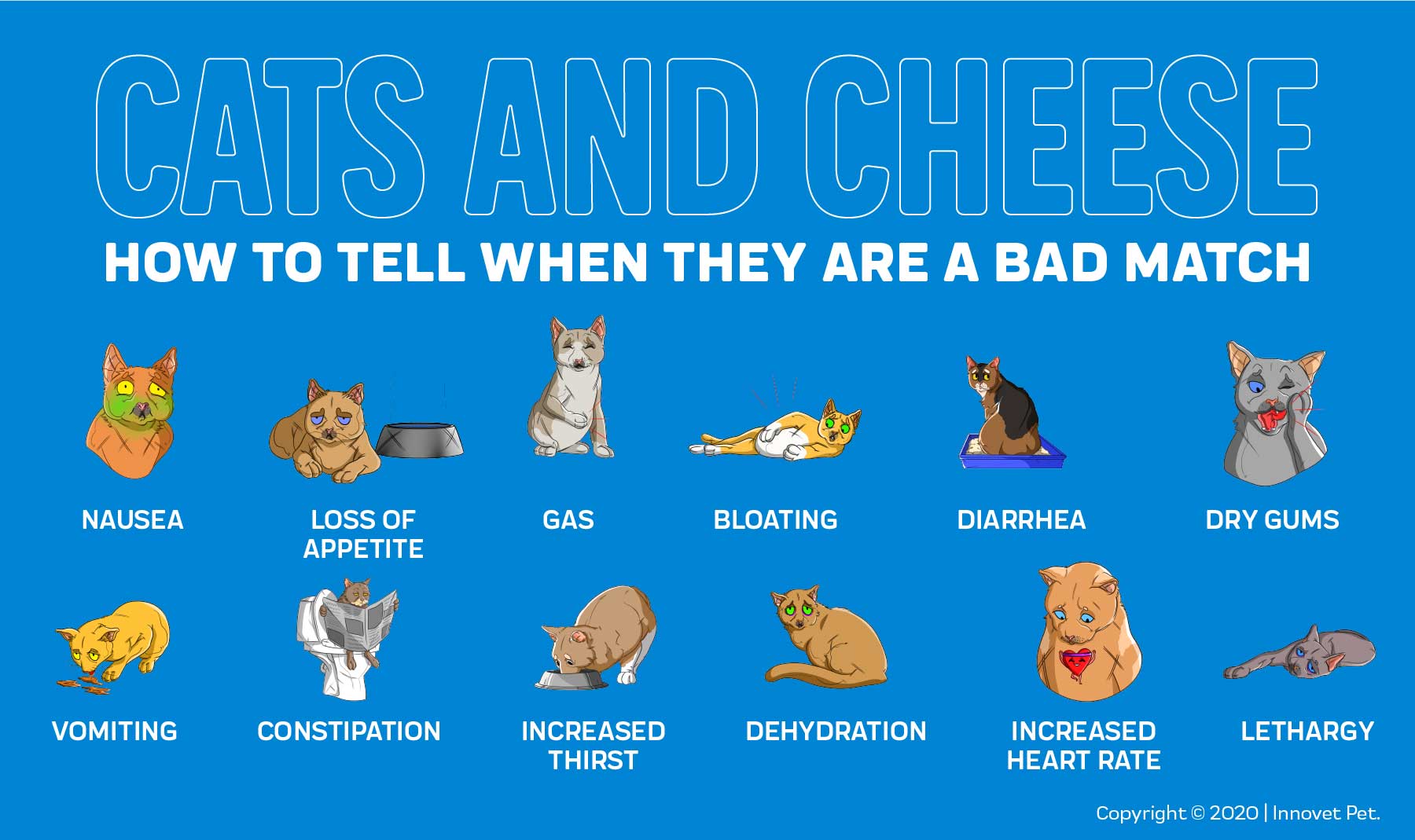
Cats and Cheese and Age
Your cat may tolerate cheese well when they are young and then develop problems with it as they age. If you give your cat cheese and they respond poorly to it, don't assume they can't have an allergy or bad response because they didn't in the past. This is yet another reason not to let your cat get too used to cheese as it will be harder to cut it out of their diet if they start having a bad reaction. That's sad and stressful for everyone.
Cat Nutrition
Cats are strict carnivores, so their diet is supposed to be meat. Not animal products. Meat. Also, not sugars and carbohydrates.
Yes, cats do eat these other things a lot, and it usually doesn't harm them. Cats can usually eat small amounts of dairy, sugar, and carbs without any detectable problem, but their bodies aren't really made to process them effectively. Make sure that if the cat does eat any of these things, that they make up a small amount of their diet.
Meat should always make up the bulk of their diet. This means their main food source should be high-quality canned cat food with some high-quality, meat-based kibble and few snacks. Meat snacks are preferable to other types as well.
Cats can eat eggs, even though that is an animal product rather than meat. It's a high-quality and safe source of protein for them.
Cheese products
Like the search result online, you may ask, "can cats eat Cheese Whiz," and other cheese-based or cheese-like products.
The answer is: it depends on the ingredients in the cheese product. Read the ingredients list to see if it contains anything toxic to cats, like onion powder.
The cat may also be allergic to something else that is in the product. This would be personal to your cat and you would eventually be able to determine a pattern between foods containing that certain ingredient and symptoms of cat allergies. If your cat develops allergic symptoms or simply seems ill after eating a cheese product, call or take them to the vet for serious side effects and write down potential allergens in the food so you can keep track should something like this happen again in the future.
Tips for Cats and Cheese
If you're asking, "can I give my cat cheese," you want to share the joy of cheese with your cat. And you can do that, sparingly. Just don't make it a routine snack.
Unless your cat has a terrible allergy to cheese and develops serious symptoms, you don't need to freak out if your cat gets into some or someone else feeds it to your cat.
Do be aware that any cheese product that is not just cheese may contain other ingredients that the cat may be allergic to or may be toxic to them. Don't feed them cheese products without checking and researching the ingredients list, and if they get into a cheese product, read the ingredients list for known allergens or toxic ingredients to determine if there is cause for alarm. Even most toxic ingredients can usually be tolerated in small amounts, so judge by the ingredient, the amount the cat ingested, and any signs of illness. You could always call your vet for personalized advice to know if it is safe to wait for symptoms.
If your cat has a poor appetite, turning to cheese to try to get them to eat isn't a good option. You wouldn't want it to be a large part of what they have in their digestive systems. Unless it is their one favorite thing right now or the only thing you have on hand, try a meat snack or eggs instead. If they continue not wanting to eat normally, take them to the vet or call an emergency vet to determine the cause of the lack of appetite and the best way to address it and give them proper nutrition. Dangerously undernourished cats may need to be fed at the vet's office.
How CBD Oil Might Help with Cats and Cheese
If your cat has a poor appetite and you know the cause, you could give your cat CBD oil to boost their appetite. It has shown great promise as a gentle appetite stimulant and contains extra nutrients the cat can benefit from.
Maybe your cat has eaten some cheese and had a bad reaction to it. CBD oil also encourages scientists in studies as a remedy for nausea, vomiting, constipation, and diarrhea.
Sometimes cats don't want to eat because they are anxious. CBD oil is a popular method of addressing acute and chronic anxiety in humans and pets.
Scientists have discovered that cats, as well as dogs, horses, and humans, have an endocannabinoid system that processes its own cannabinoids. This system is made up of receptors involved with many vital organs, and it plays a large part in maintaining the homeostasis of the body. External cannabinoids like cannabidiol in CBD oil interact much the same as the body's own cannabinoids, so it can help with deficiencies or give a needed boost.
Cannabidiol can be extracted from hemp and marijuana. Hemp is one of the most popular sources because it is legal almost everywhere and it contains more cannabidiol and virtually no THC compared to marijuana which is largely THC and a little cannabidiol. This means cannabidiol from hemp can't make anyone "high." You get the potential health benefits without worrying about psychoactive symptoms or any of the other negative aspects of THC.
Using CBD Oil
There are several types of CBD oil products to cover each cat's needs and tastes.
You might choose from:
- oil tinctures
- extract concentrates
- capsules
- treats
Hemp Treats are great options to help relieve chronic pet anxiety because they are easy and fun to take every day. The option between crunchy and soft forms and the flavors mimic regular cat treats.
Capsules are easy, taste-free options for cats who need to regularly take CBD oil for something chronic like anxiety.
Extract concentrates are just cannabidiol in a container that dispenses it in little, measurable, beads. It can be given directly by mouth or added to their food. If your cat doesn't like the taste, you'll have to mask it in a stronger tasting food or beverage. These are the purest (containing only one ingredient) and most cost-effective option for buying CBD oil.
Oil tinctures are cannabidiol mixed with a carrier oil and often a flavoring to make it easier and more enjoyable to take than concentrates. They come with a dropper or sprayer so you can measure the dose by drops or sprays. These also can be given by mouth or in food.
Dosing CBD Oil
Treats and capsules will include instructions describing the dose per treat or capsule and how many you can give for your cat.
Doses are calculated for the average cat. If yours is very small, young, old, large, or sick, they'll need a different dose.
Extract concentrates and oil tinctures give you the flexibility to reach any dose your cat needs. You can give tiny doses to kittens or very sick cats. They are also convenient to have stocked so you can give different doses to each pet in your household, should they need it for any of the many health benefits CBD shows promise at offering.
Always start with the lowest possible dose for the ailment you are addressing. This will require research or vet consultation. You will probably have to tweak the dose to find the one that's right for your cat, and it is both less stressful and safer to start with a lower dose and work up.
Risks Associated with CBD Oil
CBD oil doesn't pose many risks, making it a popular natural alternative to many medications and treatments that can be too harsh or not suitable for all pets.
There are virtually no side effects from using CBD oil. Cats consuming large doses of CBD oil may experience loss of appetite, diarrhea, and/or sedation.
CBD oil impacts the liver's absorption of medications, meaning the vet may need to alter the dose of many medications to achieve normal results. Discuss the use of CBD oil with your vet should any medications or treatments be involved so they can make informed decisions about your cat. Make sure you are maintaining regular vet checkups while giving your cat CBD oil in the long term as there are mixed results from studies regarding the possibility of CBD oil having a negative or positive impact on the liver.
CBD oil has not been FDA approved at this time because it is simply too soon for cannabidiol to have undergone all the testing and trials necessary for approval. This means it is kind of experimental. It is best for cats who can't take traditional treatments or who need assistance with side effects of traditional treatments so they can continue taking them. You shouldn't use CBD oil for anything potentially life-threatening without first consulting a vet.
Many vets support and are knowledgeable of the use of CBD oil. If yours is not one of them, there may be others in your area. Call around. There are also holistic vets who may be a better bet for you.
Purchasing CBD Oil
You should be aware of the following information before purchasing CBD oil.
CBD isolate versus Full-spectrum CBD.
CBD isolate is just cannabidiol while full-spectrum CBD contains cannabidiol, other cannabinoids (not THC), terpenes, and nutrients found in the hemp plant. Full-spectrum is actually the most popular option because it causes an entourage effect that heightens the effectiveness of CBD oil, but it may not always be the most appropriate or effective option. Some users swear CBD isolate works better for them. If your cat has nutrition issues, full-spectrum's added nutrients may make it an even more fitting option for you. If it doesn't work, you can always try CBD isolate.
Third-party Testing
Dishonest CBD oil manufacturers sell products that contain low quality cannabidiol, less cannabidiol than promised, or no cannabidiol at all. Because of this, honest CBD oil manufacturers prove the quality of their products by having the products tested by an outside party and then displaying the results on their website. Here's an example of how we at Innovet show the test results from each batch of PurCBD+ 125mg.
Origin
Reputable CBD oil manufacturers will also tell you where their cannabidiol came from. Some grow the hemp and extract the cannabidiol themselves and some buy the hemp or cannabidiol from someone else. All of these options are fine as long as you can be sure the hemp was grown in a country with safe agricultural regulations.
Extraction
Check the website of any CBD oil product you consider to ensure they use the CO2 extraction method because it is the safest and purest option.
Ingredients
As with shopping for just about anything else, fewer ingredients means a safer product. Look for CBD oil products with a smaller number of ingredients and research the ones it does have so you know they are safe. Most CBD oil products will say they are natural, though natural is not a guarantee of safety. You will still need to be sure about the particular ingredients. Natural is also not as good as organic. You might look for CBD oil products made with organic ingredients, but still read the ingredients list. This is always important. Even if everything in the product is normally safe, there may be potential for your cat to be allergic to one of the ingredients.
Innovations from Innovet
At Innovet, we love to find creative, eco-friendly ways to improve the lives of pets and their families. If you are asking, "can cats eat cheese?" you might want to use our CBD oil to soothe digestive issues, boost appetite, or reduce anxiety. We also sell anti-pest products, dental products, and ear cleaners.We also create new products inspired by the needs of pet owners who aren't finding solutions to their problems with traditional means or current natural options. If this is you and your cat, contact us to see what we can do for you.
Sources:
Foods Your Cat Should Never Eat
Get the Facts About Cats and Cheese
Approved by:
Dr. Sara Ochoa
Doctor of Veterinary Medicine, St. Georges University

Sara Redding Ochoa, DVM was raised in north Louisiana. She graduated from LA Tech in 2011 with a degree in animal science. She then moved to Grenada West Indies for veterinary school. She completed her clinical year at Louisiana State University and graduated in 2015 from St. George’s University. Since veterinary school she has been working at a small animal and exotic veterinary clinic in east Texas, where she has experience treating all species that walk in the hospital. In her free time, she likes to travel with her husband Greg, bake yummy desserts and spend time with her 4-legged fur kids, a dog Ruby, a cat Oliver James “OJ”, a rabbit BamBam and a tortoise MonkeyMan.
Thanks for stopping by!
P.S. We Love You!
Sincerely,
The Innovet Team
Please do not ask for emergency or specific medical questions about your pets in the comments. Innovet Pet Products is unable to provide you with specific medical advice or counseling. A detailed physical exam, patient history, and an established veterinarian are required to provide specific medical advice. If you are worried that your pet requires emergency attention or if you have specific medical questions related to your pet’s current or chronic health conditions, please contact or visit your local/preferred veterinarian, an animal-specific poison control hotline, or your local emergency veterinary care center.
Please share your experiences and stories, your opinions and feedback about this blog, or what you've learned that you'd like to share with others.












